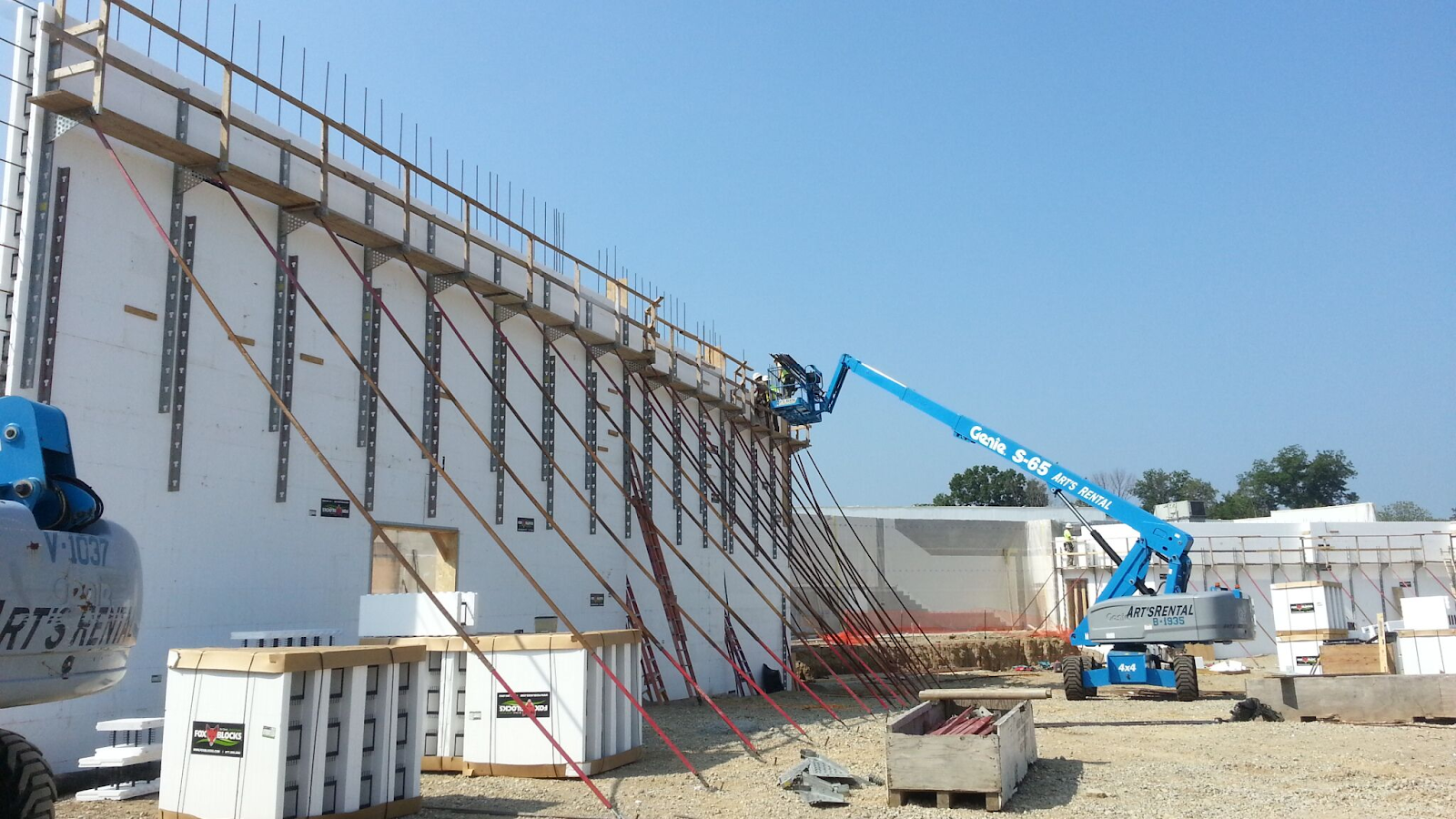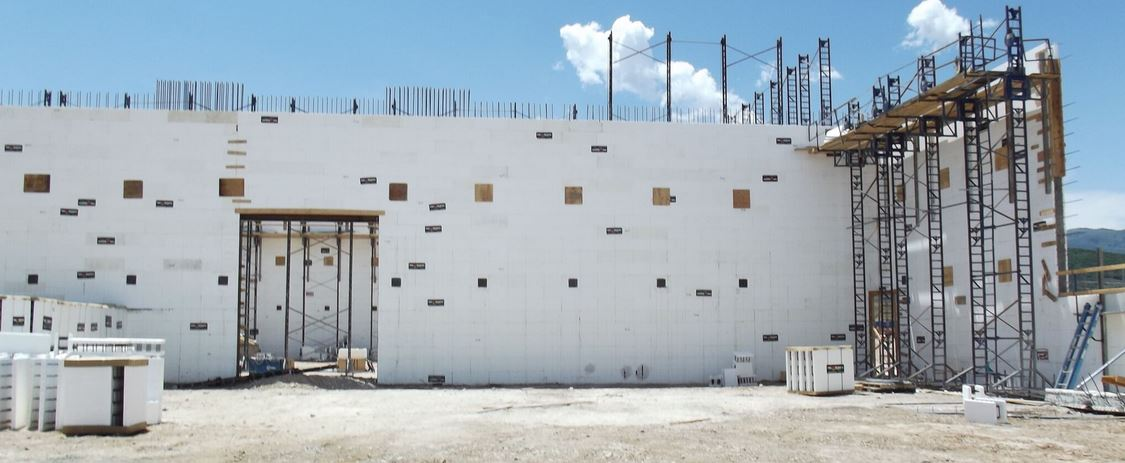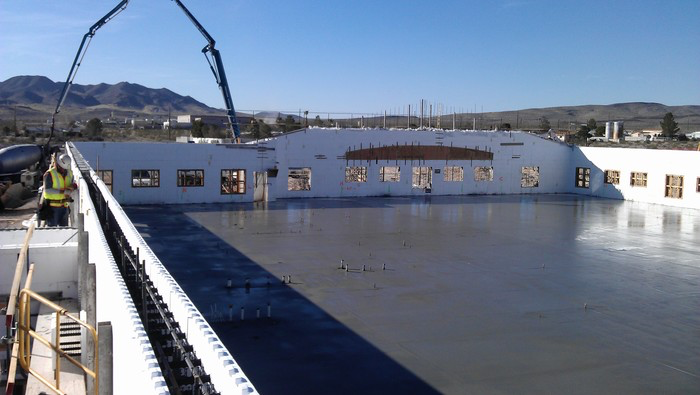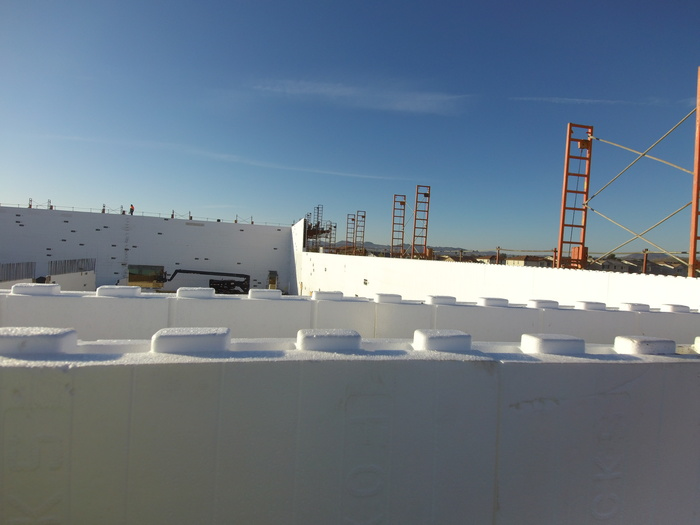
Top 22 ICF Commercial Construction FAQs

Insulated Concrete Forms, or ICFs, are a fairly modern innovation in the construction and building materials industry — but they have become commonplace for both commercial and residential construction as more stringent energy efficiency and natural disaster-resistant building codes are adopted; which has made them more cost-effective than traditional wall assemblies trying to comply with these codes with multiple layers.
Commercial ICF construction has strict standards, codes, budgets and timelines to follow, and making sure you implement ICFs accurately and efficiently is important. We compiled a list of the top ICF FAQs we get to help you feel confident in your decision to choose Insulated Concrete Forms for your next project.

1. What is ICF?
ICFs, or insulated concrete forms, are hollow blocks or panels made with expanded polystyrene insulation (EPS). The ICFs are stacked to form the shape of the building. Steel rebar reinforces the hollow centers that are then filled with concrete. Placing concrete into the hollow centers of the blocks or panels creates interior and exterior layers of continuous insulation (CI) and lessens thermal bridging throughout the wall.
Fox Blocks ICFs provide steel-reinforced concrete walls, which is one of the strongest wall assemblies for below and above-grade applications, even exceeding safety, resilience and durability requirements for FEMA-ATFP Federal Military Standards.
Because of their continuous double-layer insulation, ICFs provide superior thermal comfort, energy savings and sound mitigation. They have an R-value of 23.5+ and create a solid monolithic wall air barrier that exceeds the code minimum for airtightness, thus creating comfortable indoor environments with enhanced climate control.
ICFs also have a continuous natural vapor barrier for healthy air quality. Fox Blocks wall assemblies, specifically, have a PERM rating of <1.0, virtually eliminating moisture intrusion, mold and rot.
Fox Blocks ICFs come with full height embedded fastening strips (or furring). This gives you a solid attachment for any exterior or interior finish, eliminating thermal bridging. They are strong enough to work with every material, from brick to siding. The block design incorporates reversible interlock which saves construction time and reduces product waste.
2. Why would I want to use ICF for my next commercial project? Why should I use Fox Blocks ICFs versus their competitors?
Most ICF blocks share common features and benefits. Where Fox Blocks stands out is our 30 years of experience in product development, documentation, testing and training, and versatility in our line of products to ensure we meet all applications and building sizes. Fox Blocks has provided solutions for over 100,000 commercial and residential projects across North America. Fox Blocks’ significant product engineering upgrades have made it known as an “Industrial Strength” product.
Fox Blocks also has extensive resources and support systems in place to ensure your project’s success from the beginning to the end. We have project galleries, case studies, installation and technical guides, local reps and installers, and top-notch customer and technical support.
3. Does Fox Blocks provide guidelines for installation?
Yes, absolutely. Fox Blocks offers an extensive Technical Information and Training Guide. It consists of an overview of Fox Blocks’ features and benefits, a full product guide, a how-to section and a cost estimator tool.
To keep your installation streamlined, Fox Blocks also offers an Installation Checklist. This reminds you to stay in proper sequence and ensures you don’t miss any important steps.
If you find yourself learning better via video instruction, Fox Blocks has a YouTube channel that publishes the latest in ICF construction videos that showcase and teaches about the technology of insulated concrete forms, how-to tips when using ICFs, as well as highlighting special projects that have used Fox Blocks.
Fox Blocks also has an online Integrated Learning Center that has several learning courses about ICF, including how to install Fox Blocks and a product knowledge series.
4. How much will ICF cost me (compared with other materials)?
If you build with Fox Blocks ICFs, you will have a high-performance wall system for your commercial project meeting and exceeding the latest code requirements. Building with any type of traditional wall assembly, from stick to steel to CMU or tilt-up, has multiple different factors that will add to your final costs.
What additional materials and specialized labor are required to make a conventional commercial wall assembly equivalent to the strength and performance of a single step Fox Blocks ICF commercial building envelope? What will your energy bill be with a less insulated traditional wall? How long will different layers and materials take that will add to your construction schedule and increase costs and delays?
Conventional wall assemblies such as tilt -up, CMU and light framing all require considerably more material, insulation and attention to air sealing to make them meet current standards. All of this adds material, time and labor costs to the overall project.
In contrast, Fox Blocks ICFs give you a simple method that produces high-quality results with ongoing benefits from the high insulation value and mass concrete walls that are energy-efficient, disaster-resistant, soundproof, and provide cost savings for the life cycle of the building. Our ICFs even exceed energy code requirements in most locations, no matter if the climate is cold, hot or wet.
You can’t truly compare cost per square foot between conventional construction materials and ICFs. It is like comparing apples to oranges. ICF construction is thinking long game when it comes to your wallet. The good news is in today’s commercial construction market ICF has become a true cost-reducing value proposition right out of the gate.
If you would like assistance in understanding your specific construction costs, Fox Blocks would love to have a local rep contact you to review your project and provide a material estimate with information on your shape and size of the building, the number and size of your openings, and your region. Contact a representative here for more cost information.

5. How can I estimate/calculate how much ICF will I need for my project?
Fox Blocks has a Project Estimator tool, created by industry professionals with decades of experience with ICF, that allows you to enter your construction specifications for a Fox Blocks project to help you determine an approximate material and labor estimate. You can estimate your ICF quantities including specialty blocks, linear feet of rebar, volume of concrete, opening material, ancillary products and more.
In the Fox Blocks Resource Center, you can also download estimates on hourly labor, which is the largest contributing cost to any construction process. For extra help, check out our YouTube video that easily explains how to use the price estimator tool.
6. How should I communicate the benefits of ICF to my client?
Building commercial developments with ICF construction creates structures that are disaster-resistant, energy-efficient, environmentally-friendly, quiet and durable. Fox Blocks are also quick and easy to install which saves developers and contractors time and money, expediting overall completion timeframes by weeks or months over conventional construction.
ICFs provide architects the design flexibility to create code-compliant, energy-efficient and disaster-resistant buildings with excellent Indoor Air Quality (IAQ). Fox Blocks ICFs meet the demands and concerns of many of today’s contractors and developers, including a solution to labor shortages.
Listen to the concerns your client has with their building project and explain the benefits of ICFs in ways that will aid them in their successful completion. Coming off as an ICF expert and clearly communicating the benefits will wow your client and give you major credibility.
7. How high can I build with ICFs?
You can build multi-story structures with ICFs, typically stacked and poured several stories at a time. Today in many markets ICF mid-rise and high-rise buildings are going up. To date, tallest is over 30 stories — and there are many more in the works.
Individual walls using ICF have been engineered and built up to 68 feet tall. In most applications, ICF projects can be designed using ACI 318 and are designed just like any other steel-reinforced concrete wall. You can talk specifics about building and wall height with your Fox Blocks local representative.
8. Is a building built with ICF safer than a wood-framed or steel building?
Disaster-resistant buildings built with ICFs provide more protection than those made with either wood or steel framing materials. The Portland Cement Association (PCA), compared the structural load resistance of conventionally framed walls to ICF walls.
They concluded that concrete walls have a higher structural capacity and stiffness to resist the in-plane shear forces of high wind than steel or wood-framed walls. Moreover, the concrete walls' strength reduces the lateral twists and damage to non-structural components of a building, such as the plumbing and electrical.
ICF walls also resist damage from debris flying over 100 mph. Astudy by Texas Tech University compared the impact resistance of wind-driven debris between conventionally framed walls and ICF walls. The study found that ICF walls resist the impact of wind-driven debris, while conventional framing didn't prevent the penetration of airborne debris into the walls.

9. What would happen to an ICF protected building in a fire? In a flood? In a hurricane?
Fox Blocks have been tested to meet the building code requirements for flame spread and smoke development, plus they can be used as fire resistant rated wall assemblies in schools and hospitals.
Fox Blocks solid continuous monolithic concrete walls have a moisture-resistance and permeability (perm rating below 1.0). They ensure that moisture that enters the wall system dries out and won't move on to nearby materials. The reinforced concrete construction won't degrade when wet and maintains its original integrity and shape during and after a flood.
ICF like Fox Blocks’ starts with lightweight polystyrene and then gains strength from placed concrete. It is the building material that architects and engineers increasingly turn to for commercial and military federal applications meant to withstand extreme weather and hurricanes.
ICF can stand up against winds over 200 miles per hour, and the additional insulation means the concrete cures even stronger than standard concrete forms.
10. Will it be harder to remodel or renovate a building later on if I implement ICFs into my walls?
Not necessarily. Openings can be cut into concrete walls with tools that are easily attainable from most tool rental stores. You can also add more walls by connecting them to existing walls.
It might be a little harder than other building materials to remodel because of its extreme durability, but it is still possible.
11. Do local or regional building departments accept ICFs? Are they code compliant?
Yes, ICFs are covered in the building code, and Fox Blocks ICF has a product evaluation report that confirms the product and applications meet the requirements of the respective building codes in the USA and Canada.
Fox Blocks and the ICF industry, in coordination with the ICC-ES, ASTM and ULC, have developed standards for the manufacturing and design of flat wall ICFs. These standards are now recognized in building codes and must be included in the evaluation process for product approval.
You can read more about Standards & Building Codes that Fox Blocks ICFs comply with here.
12. How do I determine what size ICFs to use?
Fox Blocks has a great resource center to help you estimate your project materials. ICFs provide a reinforced concrete wall that is designed for specific engineering materials, so you need to make sure you use the right size ICFs.
Fox Blocks offers three methods to calculate the block sizing for your project:
- Use the math in equations Fox Blocks developed here to quickly calculate your estimate.
- You can use Fox Block’s Project Estimator.
- You can download the stand-alone Project Estimator Pro which includes most aspects of an ICF build.

13. How much bracing is needed for ICFs?
ICFs are held in place with either low expansion spray foam or a metal starter track. Then bracing/alignment systems typically installed after the 4th course of blocks also support the ICFs in place. This makes the amount of bracing needed during construction a straightforward takeoff item
Fox Blocks walls are designed as reinforced concrete walls, with steel reinforcement bars specified to be installed vertically and horizontally, as the walls are built. Typical reinforcement bar sizes used are #4 or #5 (10 m or 15 m) for light to medium commercial projects and larger sized bar for heavier projects of scale.
14. Do I have to use a special concrete mix for pouring?
The concrete is normal strength, minimum 2500 psi (20 MPa) per building codes. The mix design specifies a smaller aggregate and higher slump than concrete typically used for cast in place walls. Most Ready-Mix suppliers are familiar with an ICF concrete mix design.
15. Do walls need to be vibrated when I pour the concrete into the forms?
Yes, Fox Blocks requires you to vibrate per ACI Cast In Place wall pours, as this lowers your risk of voids or rock pockets in the wall. Fox Blocks are designed to maintain a high safety factor of pressure from the liquid concrete even with internal consolidation which is mandated within the installation guide.
You should have a pre-placement checklist on hand and review it for all wall assemblies prior to the placement of your concrete to find potential problem areas and install additional strapping or support to prevent blow-outs.
The concrete mix is a high slump 5"- 6.5" (125 mm – 165 mm) with a smaller aggregate size so the concrete flows easily. The person in charge of placing the concrete should watch the concrete flow throughout the whole wall to ensure there are no void pockets. Internal vibrating provides good consolidation, eliminating voids.
16. How do you install windows, doors, exterior siding, plumbing and electric into ICF walls?
A wooden or vinyl frame (or "buck") is built to the specified size of the window or door rough opening and then inserted into the wall. The buck is secured into place and concrete is poured around it.
Fox Blocks has an accessory, called the Fox Buck, that is a fully integrated, continuous insulation window and door buck for residential and commercial applications. The 1″ x 1″ notches create a dual barrier against drafts or moisture penetration. When installed properly, the concrete barrier protection is continuous around the entire opening.
These barriers also anchor the Fox Buck to the wall with enough strength for weather events. The buck is exactly 2″ thick for easy measurements and measures 48″ long to match the length of the three blocks. The buck features a 1- 1/2″ wide “fastening zone” for door and window attachments that runs the full height of the buck every 8″ on center.
Notches ensure proper alignment between the buck and the wall form. On the inside, dual full-length 1″ x 1″ grooves create a solid concrete barrier against drafts and moisture. Circles are marked at 16″ centers for sill cutouts and vibrator access. The expanded 2015 Fox Buck product line now includes the 4″, 6″, 8″, 10″ and 12″ sizes.
Fox Blocks are compatible with all exterior finish materials and systems: siding, acrylic stucco, traditional stucco, masonry veneer, simulated stone and more. The attachment of certain exterior finishing systems is recommended with exterior grade screws fastened into the concealed webs.
Most electrical and plumbing runs are set into chases that are cut into the foam after the concrete has completely set. Electrical boxes, drain lines and supply lines need to be affixed directly to the concrete after cutting the foam away. Electrical conduit and certain plumbing fixtures may be placed within the wall cavity prior to concrete placement, depending on your needs.

17. How do ICFs improve my energy performance?
Buildings that utilize Fox Blocks ICF have a clear R-Value of 23.5+. The continuous double layer (inside and outside) of insulation, the elimination of thermal bridging, and minimal air infiltration allow Fox Blocks walls to be high-performing when it comes to energy efficiency.
When you couple ICF walls with energy-efficient windows, doors and roof installation, Fox Blocks buildings can easily meet and exceed energy code requirements and exceed the minimum requirements for Energy Star and EnerGuide. A Fox Blocks structure requires 44% less energy to heat and 32% less energy to cool.
18. Do I have to wait until a certain time of year/type of climate to install ICF?
One of the greatest features of ICF is that it can be installed in any climate and at any time of the year. The forms insulate the concrete and enhance the curing process during
cold temperatures. The top of the forms or exposed concrete areas will need to be covered, temporarily, with insulate to prevent the exposed concrete from freezing.
Fox Blocks can be constructed any time of year with no delays related to cold weather, something many other building materials cannot say.
19. Will I need to add waterproofing or dampproofing for ICF walls that are below-grade? What about vapor barriers?
All ICF walls that are installed below-grade and have habitable space on one side like a basement, must have a waterproofing/dampproofing membrane installed. For any walls that do not have a habitable space on one side, like a crawl space or frost walls, the EPS can be exposed to the earth and will not deteriorate or become damaged.
The characteristics of an ICF wall with the mass concrete and the EPS insulation provide the required vapor permeance to meet building code requirements as a vapor barrier, so you should not need to install an added vapor barrier. If your site conditions are highly susceptible to vapor contamination, you should reach out to a vapor barrier membrane expert.
20. Can I install ICF myself or will I need to hire extra specialized labor?
ICF is not a DIY project. Fox Blocks recommends that all installers using Fox Blocks ICFs complete a training program specific to the material to ensure they have a complete understanding of the basics. For first time installers, you should definitely hire a Fox Blocks trained, experienced installer.
A Fox Blocks trained and experienced installer is able to inspect the installation prior to the placement of concrete and can assist in the placement itself. Since they are familiar with working with concrete and wall assemblies, they can ensure the build is structurally sound and that the walls are consolidated properly, built straight and plumb.

21. Are ICFs environmentally friendly or sustainable?
Fox Blocks are incredibly environmentally friendly. Fox Blocks ICFs contain a minimum of 40% recycled content by weight. They do not off-gas and are not manufactured by any gases that deplete the ozone or are harmful to the environment. They require low embodied energy to manufacture.
Fox Blocks do not contain any materials that promote mold or mildew growth and are an efficient construction method, thereby reducing the amount of construction waste, dust and air pollution in the building process.
Since they save you on heating and cooling costs, less air is exchanged between the outside and inside of your home, requiring a smaller, more efficient HVAC unit for your building. Fox Blocks provide a secure, durable, comfortable and long-lasting building with its sustainable nature.
Every component of the Fox Blocks form itself, plus the concrete and reinforcement bars, are recyclable.
22. I’m interested in the Fox Blocks ICFs. How do I get started?
Fox Blocks has a wide-ranging network of knowledgeable product distributors and trained installers across North America; you can use the Find A Dealer tool on our website to find the ten closest Fox Blocks product distributors or trained installers in your area based on your zip code.
If you unsure if Fox Blocks ICFs could be a solution for you, check out some of our successful case studies here, to see how others have benefited by choosing ICF.
If you still feel like you have some questions unanswered, check outFox Blocks’ FAQ page for even more information, and reach out to Fox Blocks today to have a local rep contact you. Let us help you take the guesswork out of ICF construction.